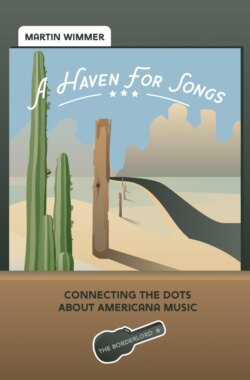Читать книгу A Haven For Songs - Martin Wimmer - Страница 4
На сайте Литреса книга снята с продажи.
Introduction: Dérive / Hill Country Rain
Оглавление"Capitalized time stood still. Without a train, without a metro, without a car, without a job, the strikers made up for the time they had lost in such a dreary way in the factories, on the streets, in front of the television. They drifted, they dreamed, they learned to live," says René Viénet.
And who says: "I write sadder song lyrics than Townes Van Zandt?” My aspiration is that every person be given the education to do so, the free time, the financial resources, the technical equipment, the network of friends, the aesthetic experiences in all fields of art, the freedom to travel in space and time. That general anarchy allows private passion to be nurtured in public discourse. Drift, dream, learn, live, love.
Hank! Sounds of village joy arise. Here is the people's paradise. Contented, great and small shout joyfully. Here I am Man, here dare it to be. Drunk and unshaven, a sad love maven. Gonna sleep over there, that's where the music's coming from. Haven, oh haven. I don't need any guide, I already know the way. Oh, help me in my weakness, I heard the drifter say.
To drift? Dérive? In the second issue of the journal of the Situationist International, an art movement of the 1960s that contrasted being at the mercy of the spectacle of capitalist society with the production of an intense situation as an aesthetic concept, and to which René Viénet also belonged, its mastermind Guy Debord wrote in 1958: One of the most important Situationist practices is dérive, "a technique of rapid passage through varied ambiances." The artists suggested: Depending on what you are after, choose a landscape. "Choose the season and the time. Gather together the right people, the best records and drinks. If your calculations are correct, you should find the outcome satisfying." This gathering of experience is what we will try to do in this book: Connecting the dots between landscapes and cultures and history and literature and film and psychology. Music and art and politics and love.
This is not a scientific publication, so you will find no footnotes, no sources for quotations, no references. These texts are not about being correct. Deem them trustworthy. Consider them story songs, pieces of art, literary and lyric essays. They blur the boundary between journal and fiction and poetry. While much of the writings about music we read these days strive to stimulate consumption, these are mostly about the amazement, happiness, blissful sensation, and open questions arising from having an involvement with situations, experiences, emotions. Give me the beat and free my soul, I wanna get lost in your rock 'n' roll and drift away. I'm singin' about a driftin' way of life.
Related to dérive in European and American folk music are the rhetorical figures of driving and drifting. The musician on the road, the flaneur, the troubadour, the vagabond, the tramp, the hobo, the truck driver, the easy rider, the captain. Fair wind in our sails, dead wind in our faces, turbulence: On the road again, ridin' on the City of New Orleans, Hank Williams pain songs and Jerry Jeff train songs, I got boats to build.
A bandit is always on the move. He rides. He bums around. He rambles and gambles. Bandits live outside. In the Appalachian forest. In the Llano estacado. On the Colorado. Along the Gulf of Mexico. On the mountains is freedom, on the sea life is beautiful. Rebels must hide, seek shelter with allies and insiders and fans, gang up. Jenny gathers pirates around her from a ship with eight sails. Brecht's Hannah Cash, Johnny's Rosanne Cash and Caroline from Tecumseh Valley bunch up. Robin Hood had his Friar Tuck, Willie Nelson his Waylon Jennings. Let's organize a posse. Or a band. Dirty red bandanas. Their home is the woods, the trail, the bandstand. They travel in the tour bus, camp in lots, camp in glades, camp and queer and dada. Everglades, evergreens, forever blue. Outlaws live outside the law. Highwaymen don't follow the lawyers and such of Nashville. Castaways live outside, they need horizons, wide open spaces, room to make their big mistakes, echo chambers. They want to be audible, visible, need a platform, the stage and spectators. Revolutionaries need to do good deeds. Steal from the rich. Play solos. This machine kills fascists. Flageolet! Fluxus ole!
Whipsawed, hurled, driven. I have achieved nothing in my life. Not a seed sown. No tree planted. No school founded. No house built. No fortune accumulated. No child begotten. I was no role model to anyone. The cultural footprint of my life is totally fine: "When I leave I'm leavin' nothin' behind," Jerry Jeff Walker sings in "Hill Country Rain," his definitive statement on the Texas lifestyle. So there's only one thing left to do:
"I get a feelin', somethin' that I can't explain, it's like dancin' naked in that high Hill Country Rain."
